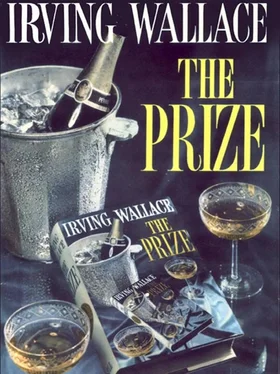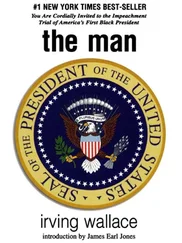‘Because I know about the present. What did you do before you won the Nobel Prize-write advice to the lovelorn?’ Quickly, she repaired this. ‘I was just joking. I didn’t mean to be fresh.’
‘Please don’t apologize for being “fresh” to me. That word freezes me. One is fresh to elders. I’m not an elder. I remember the first time a pretty girl, introduced to me at the country club, said “sir” to me. That was the day I realized I was middle-aged.’
‘I don’t mind middle-aged men,’ she said. ‘In fact, I prefer them. They’re more comfortable to be with.’
‘Another barb. Are “non-romantic” and “non-threatening” synonyms for comfortable?’
‘I hadn’t thought, and I won’t try. No deep thinking for me tonight. No self-analysis. Only champagne and the King.’
‘In other words, you’re still upset?’
‘And you’re too damn perceptive. Don’t undress my poor psyche here.’ She spoke without anger or objection, in a flat, low, matter-of-fact voice. She held herself in reserve a few seconds, peering at her drink but not drinking, and then she met his eyes. ‘Yes, I’m still a little unstrung. I suppose you want to know why?’
He nodded. ‘I want to know.’
‘Here’s material for your next book, Mr. Craig. We were talking back there, and Dr. Garrett was baiting Dr. Farelli-with little success, I might add-and Dr. Garrett told what he did in the war, and then Dr. Farelli mentioned that he had been interned in an Italian jail, and he questioned my uncle, and my uncle spoke of being held as a hostage for my mother and me. We were in Ravensbruck through the entire war. Then my mother was separated from me and shipped, in a cattle train, to Poland, to Auschwitz. Anyway-anyway-Dr. Garrett asked if she had been-what was the fashionable word?-liquidated in a crematorium? And I don’t know-that just made me ache-as if it had just happened-as if I was just looking into a-someone’s coffin, someone close-and I guess I-lost my poise. It’s silly, because I hadn’t thought of my mother, in that way, for years. And then out of the blue, among strangers, in this formal place, it all welled up. Now, there you have your material, Mr. Craig.’
He was deeply moved. ‘I don’t want material from you, Miss Stratman.’
‘What is it you want?’
‘Someone to talk to like this.’
The liveried servant had returned with his plentiful tray, and Craig took a glass of champagne, and waited for the man to go. When he was gone, Craig at once resumed with Emily, as if fearing that he might lose her.
‘I’ll revise what I just said. What I want is not someone to talk to-but specifically you to talk to. No explanation. You see a girl, a young lady, and because her eyes are green, or her smile crooked, or she brushes her hair back from her eyes-’
‘Or she’s upset.’
‘-yes, most anything like that, you want to know her. Sometimes you know her, and it’s a mistake, and you know once again you were duped by an illusion, and sometimes-’ His voice drifted off, and he shrugged and drank.
‘Is the woman you came in with a member of your family?’ she asked.
‘My sister-in-law, yes. How did you know she wasn’t my wife?’
‘I read the newspapers, Mr. Craig. I read books, by the bushel, and I read about their authors. I knew you were a widower.’
‘Yes, I am. My sister-in-law has been wet-nursing me for three years, ever since.’ He considered evoking Harriet, but felt that he owed her nothing tonight, not in this reality, and so he did not speak of her.
‘Your sister-in-law is handsome.’
‘I guess so. I really don’t know.’
‘Did your wife look like that?’
‘My wife was more feminine, in a way.’ He was not exactly sure, right now, how feminine Harriet had been. It was a relative matter, anyway. In relation to Leah, Harriet had been more feminine. In relation to the girl before him, Emily Stratman, Harriet-the vagueness of her Slavic features and brisk efficiency-seemed less feminine. ‘Leah, my sister-in-law, planted a proprietary flag on me early, and that’s the way it’s been.’
‘How do you live?’ asked Emily. ‘I know you live somewhere in Wisconsin-but how?’
The unlovely film of the last years unreeled in memory, and he weighed the masochistic and repulsive truth, and then instinctively vetoed this truth. Like an adolescent, he wanted to impress a beautiful girl. ‘I own a sprawling farmhouse in southern Wisconsin, at the outskirts of a charming small town,’ he heard himself saying. ‘I walk or garden in the mornings, ride sometimes, see friends. After lunch, I lock myself in my study upstairs and write until evening. My nights are quiet, a few companions, or cards, or reading. Sometimes I take a few weeks in Chicago or New York, to get the hay out of my hair. I’m afraid it sounds a little dull.’
‘It sounds divine.’
Craig smiled wryly. If only Lucius Mack could have heard him. He would have said: well, old man, glad you’re turning out fiction again, and about time.
‘What do you do with yourself?’ he inquired.
‘I-I tend my uncle’s house, and work in a veterans’ hospital outside Atlanta, and, as I told you, I read a good deal.’ The statement was so devoid of life that she was ashamed, and made up her mind to embellish it. ‘And then, of course, all sorts of famous people are always down to see Uncle Max, and I’m his hostess. We have too many dinners, too many late nights. I-I go out the usual amount, like all unattached women-I don’t care for nightclubs, but you know, the theatre, drives, private homes. It’s enough to keep one busy.’ She was more ashamed than ever, and wanted desperately to change the subject. ‘I’m reading one of your books now. I bought it for the boat.’
He was pleased, and showed it. ‘Which one?’
‘I’d read them all, I thought, and then I found I’d missed The Perfect State . I’m almost through. I believe it’s my favourite. I liked The Savage the least, because it’s brutal-’
‘Like our time.’
‘-yes, like our time, and that frightens me. Armageddon was exciting and moving, but it scared me, too. The Black Hole was almost a classic, I think, though I assure you it didn’t sell well in Georgia. I remember the bookdealer trying to talk me out of it. “That’s a No’thern book, ma’m,” he kept mumbling. But this one on Plato peddling his Utopia-I think it’ll live. Uncle Max was saying it came out not long ago in Scandinavia, and that’s what got you the prize. You deserve it.’
His instinctive affection for her had become adoration. ‘I’d like to bring you to my publisher’s next sales meeting.’
‘It’s not necessary. You don’t need puffs any longer.’ She stared at him. ‘It’s odd, meeting the author,’ she said, finally. ‘I couldn’t imagine what to expect. Two of the books, three actually, were so violent-no, I mean indignant-furious. You’re not like that at all.’
‘My gift for outrage is well hidden, and only brought out for special occasions, like when I write a book.’
‘Why? It’s a virtue, not a fault.’
‘Outrage is a red flag-it invites conflict-it invites grappling with life-and the obvious part of me is withdrawn and scared and wants no trouble. Do you understand?’
‘Completely.’
‘Maybe that’s why I retreat into history, where my real self won’t be spotted and forced to fight. It’s cosier. It’s a weakness, a kind of flight, but there you are.’
‘I understand that, too. I’d wondered.’
He looked about the salon, and realized that either he was myopic or a haze had fallen over the occupants. Too much to drink, he thought, far too much, and now he regretted the escape. He wanted to belong here, faculties intact, but it was too late. ‘Enough of this talk,’ he said to her, ‘the wrong note for the eve of the Royal Banquet.’ He drained his glass of champagne in a final flagellation. ‘Now,’ he said, setting the goblet on a marble-topped commode, ‘I want to show you something.’
Читать дальше












